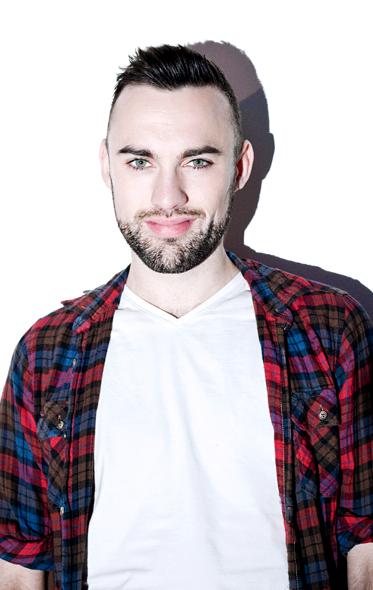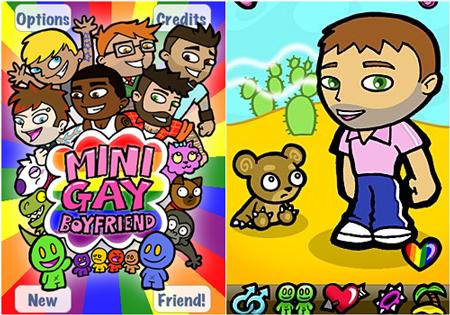
Michael Othen has sold more than 80,000 downloads of his game Mini Gay Boyfriend.
The video game industry now represents perhaps the biggest and highest-grossing media sector, yet it’s also a sector that traditionally has been slow to adopt queer characters and stories or market to queer audiences.
That’s begun to change with the launch of newer open-source platforms and distribution systems, including home consoles like Xbox 360 and mobile devices like iPhones and Androids.
Freed from the marketing directives of large publishing companies and from the licensing standards of older closed shops, such as earlier generations of Sega and Nintendo, and with almost zero costs associated with publishing and distributing their games, independent developers have had a freer hand to develop games that follow more idiosyncratic interests or niche markets.
Gay apps are nothing new. A search for “gay” in the app store turns up dozens of gay networking programs, plus dozens of gay travel guide apps.
But a few developers are using mobile devices’ unique features to create games for gay players.
Michael Othen, a developer based in the UK, created Mini Gay Boyfriend in 2010 and has sold more than 80,000 downloads of the game. Mini Gay Boyfriend operates like a Tamagotchi toy — the user selects a “boyfriend” from a roster of designs offered by the game and then must periodically play games with him in order to keep him happy and progress the relationship. If the boyfriend is unhappy, the relationship ends.
Othen created a Mini Gay Girlfriend app after the success of the game.
“It struck me that very few games out there feature ‘gay’ elements, whether or not they be characters, story lines or player driven choices. Those that do include same sex relations are generally designed to stimulate adolescent males rather than offer a genuine representation of choice,” Othen says.
“I don’t think this is necessarily a reluctance on behalf of the developers – characters in games rarely have the kind of complex personalities of their film or literary equivalents, largely due to the nature of the medium. So to attempt to represent a minority sexuality within a game’s fiction runs the risk of coming across as forced, insensitive or even offensive,” he says. “Since the only real connotation of being gay is same sex relations, it seemed only natural to make a relationship simulator. I was lucky enough to know the perfect artist to realise the idea, and borrowing somewhat from the virtual pet model, Mini Gay Boyfriend sprang to life.”
For Jaime Woo, a gay writer and game developer based in Toronto, one of the secrets of Mini Gay Boyfriend’s success is that it allows users to select boyfriends from a range of diverse options rather than forcing users to subscribe to a single stereotypical or token gay model.
“A lot of developers subscribe to an idea of what a queer character ‘should’ look like,” Woo says. “It’s tough, though. You don’t want your characters to be normative, but you don’t want them to be affected, either.”
Similarly, Squirt’s web game Kingdom Cum, which can be played at squirtgame.com, allows uses to choose from a range of avatars in a game where the player must collect condoms and lube in order to collect points by having sex with other male characters, who come in a range of body types.
Alberta-based developer BioWare received mixed praise in 2010 for releasing its game Dragon Age: Origins, in which one prominent character is a gay elf. While some cheered the company for being inclusive of queer characters and stories, others were upset that the queer character was portrayed as being very promiscuous, flirting with all the male characters.
Other developers, including Lionhead Studios and Rockstar, have included queer characters in their games, but many portrayals have been controversial and problematic.
In Resident Evil: Code Veronica, one villain is a psychotic man who crossdresses as another female character, like Norman Bates in Psycho. While the character isn’t trans, players can easily be confused into thinking it is.
Another game Woo says gets it wrong is Supergay, available for mobile devices. In Supergay, the user plays the titular superhero as he fights against a clone army of his jealous ex-girlfriend, who goes crazy and wants to kill him when he comes out of the closet.
Woo says the game’s story is misogynistic, and the fact the player is limited to playing as the tall, buff, blond, blue-eyed, white Supergay limits the game’s inclusiveness.
But worse is that the mechanics of the game aren’t very strong.
“If your mechanics aren’t good, it’s not worth doing. Make a graphic novel or a film,” Woo says.
Woo has been working to help develop the queer gaming community in Toronto for years. He started the successful annual Gamercamp conferences three years ago to help game developers network and discuss issues in the gaming community. He is planning to launch a queer gaming conference this February to help connect developers with the needs and desires of queer gamers.
Gaming may very well be the medium of choice for the current generation, in the way that television, film and comics have served previous generations. With the potential of modern game platforms and delivery systems, a queer renaissance of games made by queer developers for queer players could be just around the corner.


 Why you can trust Xtra
Why you can trust Xtra


